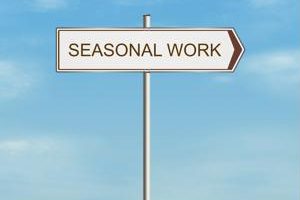
From the outdoor restaurants locals and tourists flock to for food in the summer, to the shops they fill when the winter holidays arrive, seasonal businesses represent a substantial portion of Australia's vibrant economy. While there aren't any government statistics that show what percentage of the small business pie they represent, seasonal businesses are a unique and highly important component to the country's nation's gross domestic product and employment health. As the Parliament of Australia documented, the private sector is responsible for filling nearly 97% of all jobs per year, on average.
Are you looking to launch a seasonal company? There are plenty of reasons why you may want to consider it, especially because Australia is routinely one of the leading tourist destinations in the world. But before you get your feet wet, there are a few important considerations to mull over so you know what you're wading into.
1. Identify and analyse whether there is demand
You may have a truly genius idea for a new business, whether what you're selling is a product or a unique service. It may be sheer brilliance. But good ideas don't necessarily translate to profitability; only demand does that.
The best way to determine if there is a market is by doing your own research. From speaking with potential stakeholders to leveraging social media to create a poll, identifying demand requires legwork. The more research you have, the better you can establish whether customers will respond to what your building, designing or delivering.
2. Know the rules of operation
From portable novelty stores on fairgrounds to ice cream shops along the beach's boardwalk, there are certain kinds of businesses that customers naturally think of when the weather changes. But before you can get them through the door, you may have to satisfy certain compliance requirements.
For example, if you want to provide food or beverages, you'll need to get a licence. As noted by the Australian Institute of Food Safety, mobile food units, cafes, pubs and virtually any other businesses or charitable entities that handle and sell food need licences. Your local council should be able to help with this, so be sure to visit its website. The relevant page should list the steps you need to take to be in compliance.
3. Ensure you pick the right employees
The staff of a business are always important; they represent your company's face and is ultimately what will enable you to be productive. But since there is a very narrow window of time in which you'll be able to make money and managing payroll, the quality of your seasonal personnel is uniquely critical.
Thus, be sure to install robust vetting processes so you make the most of your time — and theirs. This includes asking plenty of questions, going over their resumes carefully, following up with listed references and ensuring that their schedule aligns with your soon-to-be-running business's busy season. You may want to speak with friends who have seasonal businesses to see what procedures they've used and adopting a similar strategy.
4. Evaluate cash flow management
Wall-to-wall warmth and sun may be the ideal conditions for a steady stream of business at a water park or beach vendor, but one thing that may not be as consistent is cash flow. Depending on a variety of factors that may be beyond your ability to control — some of which may be related to weather — cash flow can go up and down. It's crucial to be mindful of this issue and have a backup plan for what you can do to enhance revenue or make it more predictable. You may want to consider speaking with a business services provider to see what strategies they recommend and what solutions they may offer.
5. Find opportunities to make money when the busy season ends
All businesses have slow and hectic periods, but for the seasonal ones, selling grinds to a halt when the months change or the temperatures fall or rise.
But that doesn't mean that you have to pack up and wait for next year to start making money again. Before you put the pieces in place to get your businesses up and running, think about what you can do when your away from the office, warehouse or pool or fairgrounds to pad your cash flow when things ramp up. For instance, if you own certain equipment, you may want to consider leasing it out to other businesses. Go online to advertise what you're selling and check to see what prices are like so you can ensure yours are competitive.
If a seasonal business is a pursuit, WMC Accounting can help you get the pieces in place with a game plan. Contact us today for a variety of managed services that can help your business shine.



